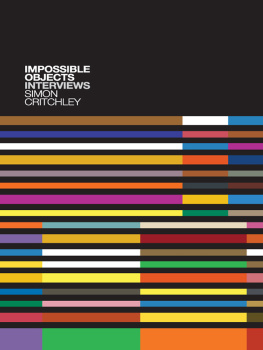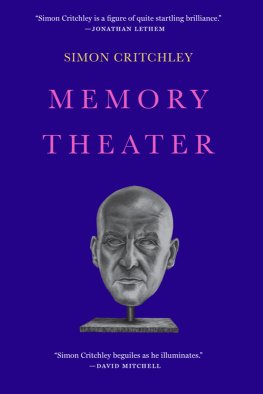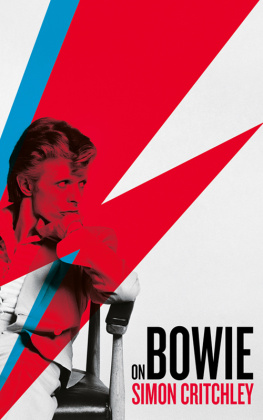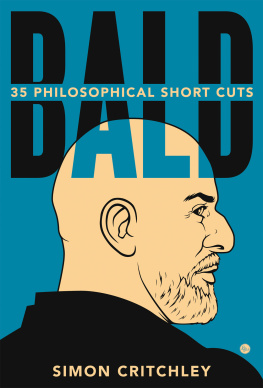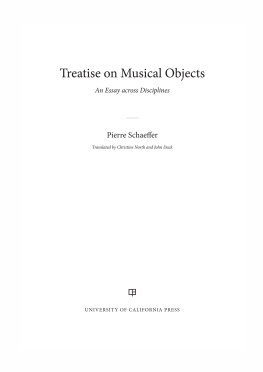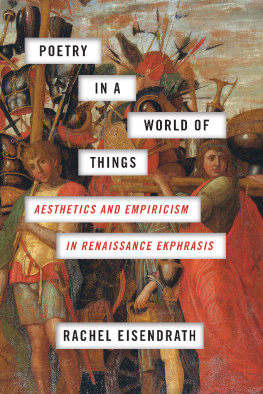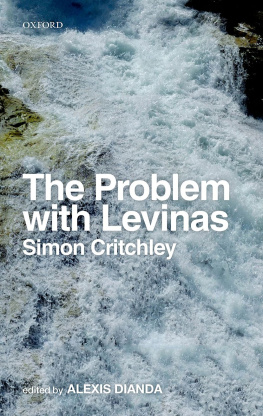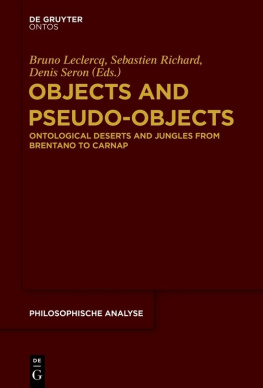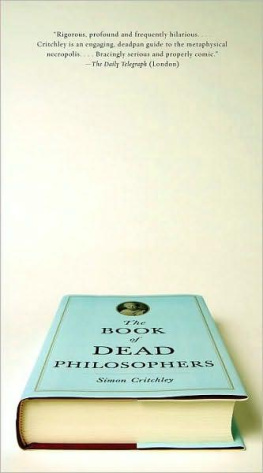Impossible Objects
Impossible Objects
Interviews
Simon Critchley
Edited by Carl Cederstrm and Todd Kesselman
polity
Copyright Simon Critchley, Carl Cederstrm & Todd Kesselma 2012
The rights of Simon Critchley, Carl Cederstrm and Todd Kesselman to be identified as Authors of this Work have been asserted in accordance with the UK Copyright, Designs and Patents Act 1988.
First published in 2012 by Polity Press
Polity Press
65 Bridge Street
Cambridge CB2 1UR, UK
Polity Press
350 Main Street
Malden, MA 02148, USA
All rights reserved. Except for the quotation of short passages for the purpose of criticism and review, no part of this publication may be reproduced, stored in a retrieval system, or transmitted, in any form or by any means, electronic, mechanical, photocopying, recording or otherwise, without the prior permission of the publisher.
ISBN-13:978-0-7456-5510-9
A catalog record for this book is available from the British Library.
Typeset in 12 on 14 pt Bembo by Servis Filmsetting Ltd, Stockport, Cheshire Printed and bound in Great Britain by MPG Books Group Limited, Bodmin, Cornwall
The publisher has used its best endeavors to ensure that the URLs for external websites referred to in this book are correct and active at the time of going to press. However, the publisher has no responsibility for the websites and can make no guarantee that a site will remain live or that the content is or will remain appropriate.
Every effort has been made to trace all copyright holders, but if any have been inadvertently overlooked the publisher will be pleased to include any necessary credits in any subsequent reprint or edition.
For further information on Polity, visit our website: www.politybooks.com
Introduction
In the time that it takes the word philosophy to leap off the written page, onto the glassy surface of your eye, and down that astonishingly complex and dark tunnel that we call the mind, most of us have already conjured up a few definite associations: timeless, absolute, true without qualification. Philosophy is supposed to be about those things we need to be most certain about, those categories or concepts where the stakes are the highest, and which determine what it means to be human, to be alive, to be on this planet. For this reason, and understandably so, most philosophers are intellectually constipated: they are more than reluctant to say anything out loud unless they are sure that they want it to ring eternally in the hallowed halls of the academy. For the philosopher, to speak is a great risk; it is to risk everything, insofar as once one has spoken, one puts in jeopardy everything that one has already said, and everything that one will say. To risk error is to risk eternity. And what could be more frightening than that.
The interview, one might say then, is for the philosopher a battlefield of anxiety, where one forgoes the right to retreat into ones quiet study of peaceful contemplation, where one is forced to speak before one knows the real consequences of ones words, where ones mouth might threaten to betray ones mind, or even ones system of thought. It is the place where opinion muddles the clarity of pure thinking whatever that might be and where one is forced to take a stance on the world in ones own time. There should be nothing more terrifying to the philosopher, and indeed, nothing more important.
It is in this spirit that the interviews presented here have been gathered and collated. They aim to trace the risk of thinking out loud and with others, within the process of developing ideas and perspectives, for better or worse, until death do us part. This process exemplifies the meaning of what philosophy, for some of us, might be about: our stake in the world, our exchange with others, the movement and praxis of thinking itself.
We originally intended this collection as an appendix to the work of Simon Critchley, but it could also be read in another way. What the written word often tries to conceal is that philosophy does not descend upon us from up on high but, rather, develops, undergoes modifications, and takes its time in doing so. This activity, this struggle in thought, in its time, constitutes the very essence of the activity that is philosophy. As surprising as this may be, its resistance to setting down a final, permanent encampment is intrinsic to it, even if this has been something that has been historically resisted, rejected, denied, and suppressed. The idea that philosophy should only appear in print, when all accounts have been settled and when all debates have been resolved, is itself nothing more than the perverse fantasy of a certain erroneous vision of philosophy that holds onto certainty like a petulant child. In this light, the interview can hardly be a mere appendix.
If the tired old clich of philosophical withholding could be called anal-ytic, the interviews collected here are unapologetically to use a Heideggerian trope diarrhetic. They are playful, at times provocative, at times entertaining, but in each case oriented towards the task of genuine thinking, by which we mean thinking that does not simply rest upon what has been said before, but aims to open up new territories, and agitate outdated philosophical platitudes. In this sense, these interviews represent thinking as a form of labor; an intellectual work, or working-through. This is, we submit, another possibility to consider, the next time the word philosophy should pass through the digestive tract of your psyche.
As Simon Critchley has been interviewed frequently over the last two decades, we were faced with an over-brimming collection of material in bringing this volume to fruition. The selections we have made were based primarily on two criteria; that they cover a reasonably diverse span within Critchleys work, both topically and temporally. The present volume consists in nine interviews, six of which have been published elsewhere in various mediums, and three of which appear here for the first time. With regard to those interviews that have appeared elsewhere, we have taken the liberty of occasionally removing certain passages solely for the purpose of avoiding repetition amongst the different interviews. We have tried, as much as possible, to preserve the original character and ow of each interview in order to maintain the spirit in which it took place.
With the intention of providing some context for the material, each of the interviews is preceded by a short introduction, interspersed with Critchleys own comments and reections. More than ten years separate the first interview from the last, and, in this respect, the reader will find a shift in philosophical interests: the most recent interview on tragedy concerns material that is still being thought through, while the earliest (from 2000) deals with questions that are no longer as central to his current perspective.
We should also say something about the title, Impossible Objects. The term comes from an abandoned project, at the bottom of one of those drawers that most of us have, and in this case it happens to have been from Simons. The book was to have been called Paraphilosophy, and it was to have been a catalogue of those themes that stubbornly resist definition and simple appropriation. At the time, three paradigmatic domains presented themselves: poetry, humor, and music. Along with these, the themes presented in this collection art, deconstruction, political resistance, and tragedy, just to name a few seem to partake of this same stubborn quality, and for this reason they seem to be appropriate amendments in the field of impossibility. To quote from Simons deserted introduction: These paraphilosophical fragments were meant to be a collection of tiny ladders that should be kicked away in order to look directly at those things of which it is not possible to speak. The point is to let things speak for themselves. Sadly, this is easier said than done. Since the objects tend to remain quiet, it is fortunate that Critchley has not.
Next page
